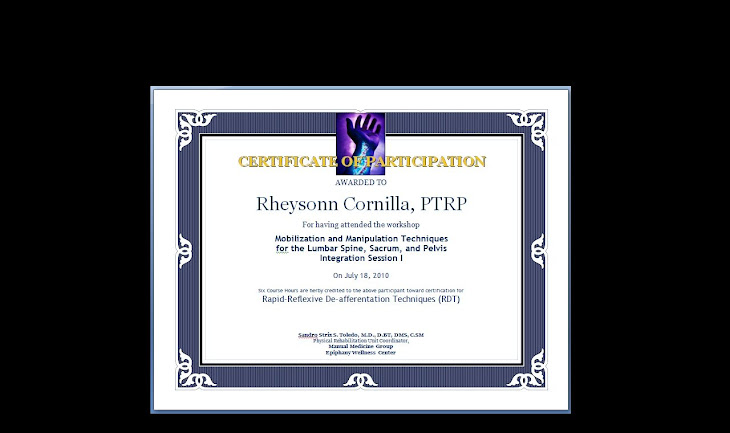Dear Colleagues,
Ever heard of the phrase "What helps one also helps others"?
We've just finished our first Manual Medicine Workshop for 2010. We finished our first two Cervical Neuromyofascial Workshops in January and February. Thanks to your continued support, these Sharing Sessions have been very well received. We would, however, like to do this Series of Workshops even better.
We went through a natural progression through our first three sessions. The Cervical 1 Session came with its own online manual, and we completed and stuck to topic as much as we could. The Shoulder 1 Workshop (2010's Session 3) started with an outline meant to run in 8 hours, completed in two hours. We then proceeded to go off the map, addressing questions about other techniques, demonstrating proven Protocols by other teachers, and proving what we clinically know to work anyway: Rapid Reflexive De-afferentation Techniques.
Last Sunday's show-and tell included the latest study (Grade-A) evidence (four main RCDB-Multicenter studies) for shoulder manipulation in place of, and as an exceptional adjunct to Medical, Medical-orthopedic, and Surgical Orthopedic approaches. Several books were also available. These both detailed the evidence for, research behind, and techniques for Manual Medicine Interventions that we used.
We also brought along standard physiotherapy and Physical Rehabilitation books from here and abroad. The point is that these approaches are standard and mainstream. Medicare U.S.A. and TRICARE International coverage backs up the known usefulness and cost-effectiveness of these approaches.
We also demonstrated the most difficult knee case we've seen, as a live-patient demo of a truly difficult intra-articular injection. Can you picture inserting a needle into a capillary tube (the ones used for CBC assay)?
These are world-class techniques and practices. Are Filipinos not world-class?
The point is that we're hoping to help everyone evolve their clinical practice.
We can not do this alone.
We are asking for your help in promoting this work, this evolution.
In line with this, may we kindly gather your feedback by filling in at least short answers for the following survey?
__________________________________________________________________________________________
What aspects of Manual Medicine / Manual Therapy / Physical Rehabilitative Manipulation would you be interested in?
Which Tuesday or Sunday would be best for you to attend Training Sessions with us?
Please specify dates for March, April, and May 2010.
__________________________________________________________________________________________
Why not "pay it forward?" When you realize that this opportunity would greatly benefit your friends / colleagues / patients, please feel free to pass on this feedback form.
With overflowing Gratitude and Respect,
Yours In the Evolution of Manual Medicine,
Sandro Strix S. Toledo
1011 MATI Building, The Medical City Hospital,
Ortigas Center, Pasig City, Philippines
Ever heard of the phrase "What helps one also helps others"?
We've just finished our first Manual Medicine Workshop for 2010. We finished our first two Cervical Neuromyofascial Workshops in January and February. Thanks to your continued support, these Sharing Sessions have been very well received. We would, however, like to do this Series of Workshops even better.
We went through a natural progression through our first three sessions. The Cervical 1 Session came with its own online manual, and we completed and stuck to topic as much as we could. The Shoulder 1 Workshop (2010's Session 3) started with an outline meant to run in 8 hours, completed in two hours. We then proceeded to go off the map, addressing questions about other techniques, demonstrating proven Protocols by other teachers, and proving what we clinically know to work anyway: Rapid Reflexive De-afferentation Techniques.
Last Sunday's show-and tell included the latest study (Grade-A) evidence (four main RCDB-Multicenter studies) for shoulder manipulation in place of, and as an exceptional adjunct to Medical, Medical-orthopedic, and Surgical Orthopedic approaches. Several books were also available. These both detailed the evidence for, research behind, and techniques for Manual Medicine Interventions that we used.
We also brought along standard physiotherapy and Physical Rehabilitation books from here and abroad. The point is that these approaches are standard and mainstream. Medicare U.S.A. and TRICARE International coverage backs up the known usefulness and cost-effectiveness of these approaches.
We also demonstrated the most difficult knee case we've seen, as a live-patient demo of a truly difficult intra-articular injection. Can you picture inserting a needle into a capillary tube (the ones used for CBC assay)?
These are world-class techniques and practices. Are Filipinos not world-class?
The point is that we're hoping to help everyone evolve their clinical practice.
We can not do this alone.
We are asking for your help in promoting this work, this evolution.
In line with this, may we kindly gather your feedback by filling in at least short answers for the following survey?
__________________________________________________________________________________________
What aspects of Manual Medicine / Manual Therapy / Physical Rehabilitative Manipulation would you be interested in?
- Neuromyofascial Mobilization Techniques
- Connective Tissue Mobilization Techniques (Active Releases, Passive Releases, Tool-Assisted Releases)
- Nerve Mobilization Techniques
- Muscle Energy Techniques
- Positional Release Techniques
- Harmonic Releases
- Neuro-muscular Rehabilitation
- Cranial Therapies
- "Brain and Beyond" Techniques
- Cranial Nerve Releases
- Structural Tensegrity Techniques
- Visceral Mobilization
- Organ and System Motility and Treatment Techniques
- Medical Acupuncture
- Trigger-Point Elimination
- Local and Intra-articular Infiltration Techniques (saline, steroids, hyaluronate)
- Medical Neurolinguistic Programming
- Medical Hypnosis
- Medical Coding. SOAPing, and Billing.
- Thrust Techniques
- The Bowen Technique
- Articulatory Techniques
Which Tuesday or Sunday would be best for you to attend Training Sessions with us?
Please specify dates for March, April, and May 2010.
__________________________________________________________________________________________
Why not "pay it forward?" When you realize that this opportunity would greatly benefit your friends / colleagues / patients, please feel free to pass on this feedback form.
With overflowing Gratitude and Respect,
Yours In the Evolution of Manual Medicine,
Sandro Strix S. Toledo
1011 MATI Building, The Medical City Hospital,
Ortigas Center, Pasig City, Philippines














No comments:
Post a Comment